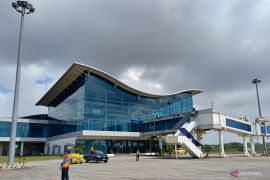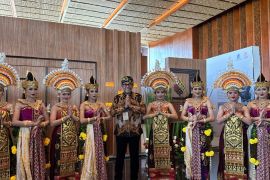The Tourism and Creative Economy Ministry predicted over the weekend that about 7.6 million foreign tourists will have arrived in Indonesia until the end of the year.
"The figure is quite good because to achieve it we had to overcome many obstacles," Vice Minister of Tourism and Creative Economy Sapta Nirwandar said on Thursday.
He said the figure exceeded the moderate target of 7.5 million tourist arrivals for this year. The ministry had set three alternative tourist arrival targets for 2011, namely a pessimistic, moderate and optimistic target or 7.2 million, 7.5 million and 7.7 million respectively.
According to the Central Board of Statistics (BPS), the number of tourist arrivals in the ten months through October 2011 has reached 6.27 million, an 8.47 percent increase compared with 5.78 million in the same period last year.
The Indonesian government was early this year convinced that it would achieve its optimistic target, saying 2011 had a positive aura for its tourism. It announced its optimistic target of attracting 7.7 million foreign tourists into the country in 2011, up about 10 percent from 7,000,571 arrivals in 2010.
The government raised by 10 percent the foreign tourist arrival target because it was convinced that the world now had a good perception of Indonesia that could attract more visitors.
"Indonesia has a positive aura in 2011 so that we set an optimistic target of 7.7 million foreign tourist arrivals in the country," then culture and tourism minister Jero Wacik said in a year-end press conference.
Besides the optimistic target, the minister also set a pessimistic target of 7.3 million arrivals as a "performance contract" target of the culture and tourism ministry with the Indonesian President.
If the ministry`s prediction of 7.6 million arrivals by the end of 2011 is true, it means that the government fails to achieve its optimistic target of 7.7 million.
Yet, Sapta still hopes it would be achieved. "Indeed the figure 7.6 million is merely a forecast. At the end of this year we will have a lot of programs in a number of border areas which are expected to increase the number of tourist arrivals," he said.
He said tourism was among the sectors which were highly sensitive to current issues and therefore the number of tourist arrivals would also depend on external factors.
Among the obstacles met in the efforts to increase the number of tourist arrivals were negative media reports on Indonesia, including bomb blasts in a number of places in Indonesia and unrest in several parts of the country, he said.
"The tourism sector is sensitive to security issues and therefore, we must deal with the security issues together," he said.
Tourism and Creative Economy Mari Elka Pangestu also expressed optimism early this month that the optimistic target would be achieved.
"We are optimistic the target of foreign tourist arrivals this year will be met. Although there is a debt crisis in Europe it has not affected tourist arrivals," the minister said.
After all, November and December are peak seasons for foreign tourists to arrive in Indonesia. So, the target set at 7.7 million with foreign exchange earnings of US$8.47 billion is most likely to be achieved.
In the meantime, the Tourism and Creative Economy Ministry has also set the target of tourist arrivals for 2012 at 8 million, with foreign exchange earnings projected to reach US$8.98 billion.
In anticipation of unexpected developments next year, the ministry had set three versions of tourist arrival targets, namely a pessimistic target of 7.8 million, a moderate target of 7.9 million and optimistic target of 8 million.
Sapta said in order to achieve the target next year, his ministry will apply an integrated strategy by disseminating the Wonderful Indonesia tag-line, introducing match market products, targeting specific segments and reinforcing the popularization of market activities.
Minister Mari Pangestu said Indonesia did not need to worry about its tourism developments as it had potentials to be developed.
"We need not worry about our tourism because we have big tourism potentials. Indonesia is the largest archipelagic country and is the world`s fourth most populous nation with a population of 237 million," the minister said.
She said that Indonesia stretched 5,120 km from the east to the west and 1,760 km from the north to the south. Besides, it was ranked in the 39th position among 139 cultural heritage rich countries.
"We have eight World Cultural Heritage Sites with the potentials to serve as host for various international festivals and exhibitions, as well as strong creative industries," the minister said.
From the age aspect, the minister said that most of the Indonesian people were still at the productive age of less than 29 years old.
"The tourism sector is Indonesia`s safety belt against global crisis because it is not as fragile as other sectors such as trade," she told a seminar organized by ANTARA National News Agency early this month.(*)
A014/H-NG/O001
Reporter: Andi Abdussalam
Editor: Jafar M Sidik
Copyright © ANTARA 2011











